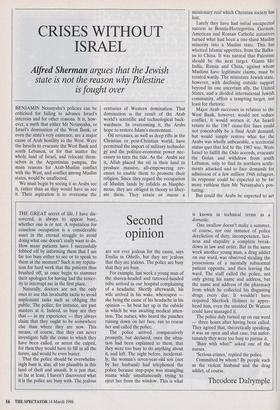CRISES WITHOUT ISRAEL
Alfred Sherman argues that the Jewish
state is not the reason why Palestine is fought over
BENJAMIN Netanyahu's policies can be criticised for failing to advance Israel's interests and for other reasons. It is, how- ever, a myth that either Mr Netanyahu, or Israel's domination of the West Bank, or even the state's very existence, are a major cause of Arab hostility to the West. Were the Israelis to evacuate the West Bank and south Lebanon, or for that matter the whole land of Israel, and relocate them- selves in the Argentinian pampas, the main reasons for Arab-Muslim conflict with the West, and conflict among Muslim states, would be unaffected.
We must begin by seeing it as Arabs see it, rather than as they would have us see it. Their aspiration is to overcome the centuries of Western domination. That domination is the result of the Arab world's scientific and technological back- wardness. In overcoming it, the Arabs hope to restore Islam's momentum.
Oil revenues, as well as deep rifts in the Christian or post-Christian world, have permitted the import of military technolo- gy and the politico-economic power nec- essary to turn the tide. As the Arabs see it, Allah placed the oil in their land to produce massive, all-empowering rev- enues to enable them to promote their religion. Since they regard the occupation of Muslim lands by infidels as blasphe- mous, they are obliged in theory to liber- ate them. They retain en masse a missionary zeal which Christian society has lost.
Lately they have had initial unexpected success in Bosnia-Herzegovina. German, American and Roman Catholic initiatives turned what had been a one-third Muslim minority into a Muslim state. This has whetted Islamic appetites, from the Balka- ns to China. It was natural that Palestine should be the next target. Giants like India, Russia and China, against whom Muslims have legitimate claims, must be treated warily. The miniature Jewish state, however, with declining outside support beyond its one uncertain ally, the United States, and a divided international Jewish community, offers a tempting target, not least for rhetoric.
Major Arab successes in relation to the West Bank, however, would not reduce conflict, it would worsen it. An Israeli return to the 1967 cease-fire lines could not conceivably be a final Arab demand, but would simply restore what for the Arabs was wholly unbearable, a territorial status quo that led to the 1967 war. Were Israel to fulfill the Oslo accords, evacuate the Golan and withdraw from south Lebanon, only to find its northern settle- ments attacked and to face demands for admission of a few million 1948 refugees, its response could be expected to be far more ruthless than Mr Netanyahu's pos- turing.
But could the Arabs be expected to act otherwise and give up their post-1948 demands in the light of initial success? It would need only a few to reject the new settlement for it to disappear in gun- smoke.
Let us take supposition a stage further. Suppose the state of Israel did not exist. Who would inherit Palestine, which by its geopolitical nature has only very rarely enjoyed independence? This small parcel of land lies on the intersection of the routes between the three main regional capitals - Cairo, Damascus and Baghdad - and the Arabian peninsula. Were it not for the state of Israel's presence, Pales- tine would long since have become a no- man's-land, invaded by Egypt, Syria and Iraq.
The very word Armageddon symbolises this: Har (the Hill of) Megido was the high ground in Palestine dominating the cross- roads where the coastal route bisected the road from the Bay of Haifa to Aleppo and on to Mesopotamia. Before the Arabs were ever in Palestine, the Land of Canaan, as it then was, was the staging post first of the Egyptians when they broke out of Sinai to conquer the Levant, then of successive Mesopotamian kingdoms and Persia on their way to Egypt, and lastly of Alexander when he complemented his conquest of Persia by appropriating Per- sian-ruled Egypt.
Later, in the seventh century — out of the Arabian Peninsula — came the Arabs with their new religion, Islam. The Arabs passed through Palestine to conquer almost the whole of what we would now call the Middle East.
Then the Arab powers which had put down roots in the region began to fight one another. Palestine became the battle- ground of two Arab caliphates: the Fatimites, based in Cairo, and the Abbasids in Baghdad. It was in Palestine, too, that the Egyptian Mamelukes defeat- ed the Mongols who, via Palestine, hoped to reach Egypt.
Only under Ottoman rule did the province cease to be fought over. It became so again in the early 19th century when Napoleon chose it as the base for his conquest of the Levant. Later Mehmet Ali invaded it from Egypt to conquer the Lev- ant and impose his will on Istanbul. A cen- tury later, Allenby used it as the natural gateway for his invasion of the Ottoman Empire. If Israel did not exist, Palestine would still be disputed territory. Neither geography nor the human condition have radically changed.
It is also reasonable to suppose that non-Arab powers would be drawn into the question of who rules Palestine. For exam- ple, the United States is closely involved with Saudi Arabia and Egypt, Russia with Syria and Iraq.
We are left with a paradox. Only the Israelis seem capable of keeping the province independent, and violence rela- tively restrained.



































































 Previous page
Previous page